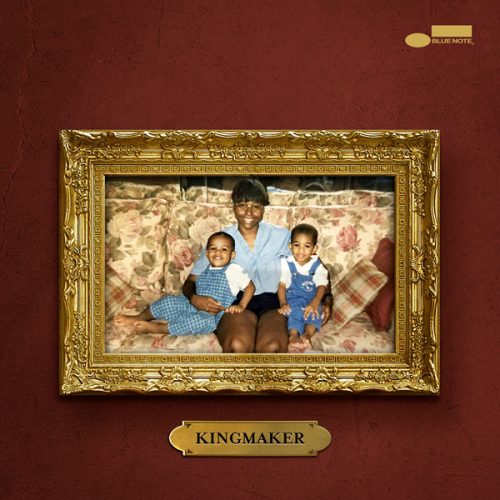May 3, 2019
“I never had a doubt that I was going to do music,” says Joel Ross, 23 years old and the most thrilling new vibraphonist in America. “My whole life it was just about finding a way to do it.” In the past few years, keeping up with all of those ways has, for aficionados, turned into a virtuosic practice unto itself. The Chicago-born, Brooklyn-based player and composer has a way of being everywhere interesting at once: from deeply innovative albums (Makaya McCraven’s Universal Beings, Walter Smith III & Matthew Stevens’ In Common) to reliably revolutionary combos (Marquis Hill’s Blacktet, Peter Evans’ Being & Becoming) to the buzzing debut of Blue Note’s 2018 breakout star James Francies (Flight). Even with his own bands—which include quartets and a large ensemble dedicated to works of and in-the-style-of Ornette Coleman and the Keith Jarrett’s American Quartet—Ross is basically a living blur of mallets and talent and ideas.
But 2019 is his year to be the star as he joins the Blue Note Records roster and adds his name to an illustrious jazz vibraphone legacy on the label that extends from Milt Jackson and Bobby Hutcherson to Stefon Harris and now Ross. While there’s no doubt that Ross will be just as tough to pin down, listeners can at last explore his vision at a human pace with his debut KingMaker, an LP that meets clear technical might with a whole lot of youthful energy and bright emotion. For his first release, Ross convenes his Good Vibes band—Immanuel Wilkins on alto saxophone, Jeremy Corren on piano, Benjamin Tiberio on bass, Jeremy Dutton on drums—for a lithe and melodic trip through a wild array of inspirations: the uncanny interplay of Miles and Wayne, the cooling touch of Bags, the harmonic acuity of Harris, the rhythmic heat of Steve Coleman, and the genius album-building of Ambrose Akinmusire. And at the heart of it all is the wisdom passed down personally to Ross from Hutcherson: “Write music about your life and write every day.”
“I took Bobby’s words literally,” says Ross, who visited the master in his home while studying in California. “Every song is influenced by people or events, relationships I had, or even a question someone posed.” KingMaker finds our host exploring the formative stuff that made him the man he is. The centerpiece and title track is dedicated to his mother, and it’s a gorgeous bit of chaos-wrangling as Ross, Wilkins, and Dutton test the song’s limits with all the passion of youth, while Corren and Tiberio steadily soothe. “Prince Lynn’s Twin,” similarly honors Ross’ twin brother and father (whose middle name is Lynn): vibraphone and saxophone present two melodies that play together, and then off of one another, while the rhythm section occasionally steps in to help guide. “Freda’s Disposition,” with Gretchen Parlato on the album’s only vocal, is a lullaby for Ross’ little niece.
“She can be very shy, very quiet and sometimes anxious,” says Ross. “My solo, to me, represents how dark and cloudy that can feel. But then comes the piano with one of the most beautiful solos on the record, and the mood lifts.” Ross grew up in a harmonious home with three older sisters and police officers for parents in a quiet South Side neighborhood. By 3, he and his twin had spent enough time beating on things around the house that it was deemed wisest to buy them separate toddler-sized drum sets. Before long they were taking turns sitting in at church, where dad was choir director at one point. They joined school band as soon as they could, age 10, and since Joel was the younger twin, he was consigned to xylophone while his brother hit skins. They auditioned for the multi-school All City concert and jazz bands too.
“To be fair my brother was the better drummer,” Ross admits. “We both made the cut and since I already played mallets they said, ‘Why don’t you try vibraphone?’ I was like, ‘I don’t know what a vibraphone is. I don’t want to do this.’” But he did, and found it the most natural way to express himself. He practiced and played constantly through numerous opportunities from the Jazz Institute of Chicago, and later became one of the first students at the city’s first public arts high school, Chicago High School for the Arts. Through ChiArts’ partnership with the Thelonious Monk Institute of Jazz, Ross got to meet kindred spirits at other high schools around the country (like Francies), jam with Herbie Hancock (his class of 2013 keynote speaker), and learn from special guest Gerald Clayton, a gateway to the beguiling music of Akinmusire, in particular the trumpeter’s own Blue Note debut When the Heart Emerges Glistening, which Ross didn’t immediately understand, so, naturally he became keenly devoted to unpacking every note.
Still, he’d never had a dedicated vibraphone teacher. Enter Stefon Harris, who after meeting Ross at a festival, invited him to try out for his Brubeck Institute Jazz Quintet at University of the Pacific in Nor Cal. Ross won it, and for two intense years worked to tear down and rebuild his approach to the instrument. “Stefon completely revamped my technique,” says Ross. “We were also learning his [now-famous] ear-training method, applying emotions to chords and hearing harmony in new ways. I figured out how I wanted to sound.” That’s where the seeds of KingMaker were planted. Ross soon transferred to the New School and finished these songs with Good Vibes, his favorite players he met at camps, contests, and gigs along the way. They ironed it out during a late-night residency at Small’s in Greenwich Village, then recorded the album, one take, in an afternoon.
“I’m never one to make a band do anything. I influence them where I can, then go with whatever is happening,” says Ross, whose chemistry with Wilkins is clear. “Immanuel’s my best friend. It’s like jamming with myself on a second instrument.” So much of KingMaker—both its content and the experience of making it—is captured by the title of a lovely late-album cut: “With Whom Do You Learn Trust?” Hutcherson’s treasured advice finds expression on the moody, mode-shifting “Ill Relations” and the tour of emotions that is “Yana” (both of which explore the many sides of romance and friendship), and the brightly tumbling “Is It Love That Inspires You?” (a query from a friend). From the sweet and slow opener “Touched by an Angel” to the LP’s ominous closer “It’s Already Too Late,” we see Ross finding his place and gathering strength. In other words, becoming the king he’s meant to be.







